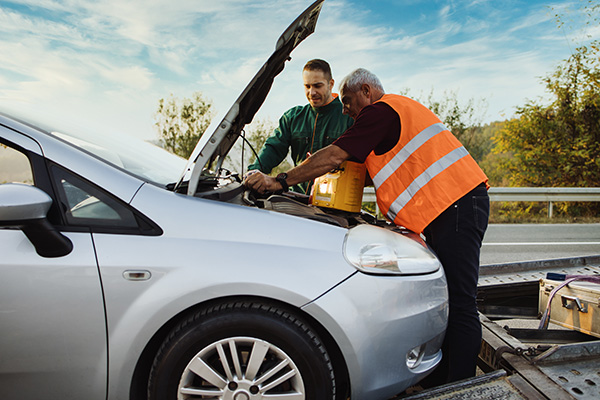
Nothing kills the excitement of a road trip faster than car trouble. One minute you’re cruising down the highway, and the next, you’re stuck on the side of the road, waiting for a tow truck. Long drives put extra wear on your vehicle, and skipping basic maintenance can lead to unexpected breakdowns. The good news? A little preparation can go a long way. Taking the time to check a few key things before you hit the road can save you from headaches, delays, and costly repairs.
Get a Pre-Trip Inspection
One of the best ways to prevent a breakdown is to have a professional inspect your car before your trip. A trained technician can spot potential issues that might not be obvious to the average driver. Getting a pre-trip inspection at least a week before you leave gives you time to address any necessary repairs without delaying your plans.
During an inspection, your mechanic will check essential components like brakes, belts, hoses, and suspension to ensure everything is in good working order. They will also look for leaks, worn-out parts, and other warning signs that could cause trouble down the road.
Check Your Battery for Reliability
A weak or aging battery is a common cause of roadside breakdowns. Extreme temperatures, frequent short trips, and old age can reduce a battery’s effectiveness. If your battery is more than three years old or you’ve noticed slow starts, it’s worth having it tested before your trip.
Cleaning corroded battery terminals and ensuring all connections are secure can also help prevent electrical issues while driving. Keeping a portable jump starter or jumper cables in your car is a smart backup plan in case of unexpected battery failure.
Inspect Your Tires for Safety
Your tires are the only part of your car that makes direct contact with the road, so they need to be in top condition for a long trip. Check tread depth to ensure your tires have enough grip, especially if you expect rain or changing road conditions. If the tread is too shallow, consider replacing your tires before traveling.
Proper tire pressure is also crucial. Underinflated tires reduce fuel efficiency and increase the risk of blowouts, while overinflated tires can lead to poor handling. Check your tire pressure before leaving and adjust it according to your vehicle’s recommended PSI.
Don’t forget to inspect your spare tire as well—many drivers only realize it’s flat when they need it most.
Keep Your Cooling System in Top Shape
Long hours on the road can put extra stress on your engine, especially in warm weather or mountainous terrain. Your radiator and coolant system play a vital role in preventing overheating. Before your trip, check your coolant levels and look for leaks in the hoses or radiator.
If your coolant hasn’t been flushed in a while, a coolant system service may be a good idea. Carrying an extra bottle of coolant in your trunk can also be helpful in case you need to top off along the way.
Ensure Your Brakes Are Road-Trip Ready
Brake failure is a serious risk on long trips, especially if you’re driving through hilly or stop-and-go traffic conditions. If you hear squeaking, grinding, or experience a soft brake pedal, get your brakes inspected before your trip.
Checking your brake fluid levels is also important, as low fluid can indicate leaks or worn-out brake pads. A brake system check ensures you have full stopping power when you need it.
Test Your Lights and Wipers
Driving at night, in fog, or through rain requires fully functional lights and wipers. Check that your headlights, brake lights, and turn signals are all working properly. Dim or burned-out bulbs should be replaced before you leave.
Windshield wipers should be in good condition to handle unexpected rain showers. If they leave streaks or skip across the glass, install a new pair before your trip. Keeping extra washer fluid in your car helps maintain visibility when bugs and dirt accumulate on your windshield.
Top Off Fluids and Bring Emergency Supplies
Your car’s essential fluids keep everything running smoothly. Check and top off your engine oil, transmission fluid, brake fluid, power steering fluid, and windshield washer fluid before your trip. If any fluids are dirty or low, consider a full service to ensure your car is ready for extended driving.
Packing an emergency kit is another important step in preventing major disruptions during your trip. Your kit should include:
- A spare tire, jack, and lug wrench
- Jumper cables or a portable jump starter
- A flashlight with extra batteries
- A first aid kit
- Bottled water and non-perishable snacks
- A phone charger and power bank
- Basic tools and duct tape
- A printed map or GPS backup in case of limited service
Stay Alert and Drive Smart
Even with the best preparation, staying alert and practicing good driving habits is key to avoiding breakdowns. Avoid hard acceleration and sudden braking, as these put extra strain on your engine, brakes, and tires. Take regular breaks to give your car (and yourself) time to rest, especially on long drives.
Keeping an eye on your dashboard for warning lights or unusual noises can help catch small problems before they turn into major issues. Pulling over and addressing the issue on-time can prevent bigger breakdowns later if something doesn't feel right.
Don’t risk a breakdown on your next trip! Visit Auto Clinic Care in Rockville, MD, for a full pre-trip inspection and drive with confidence. Call today!